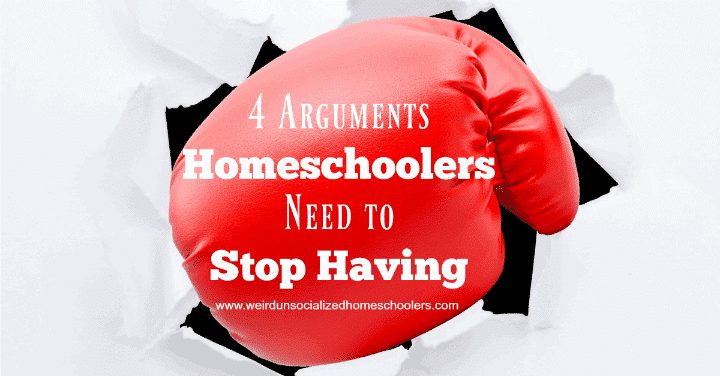4 Arguments Homeschoolers Need to Stop Having
Have you ever experienced the sting of betrayal by someone whose full support you expected based on your shared beliefs or backgrounds? I still remember a situation in which I couldn’t wait to get to work to share with a co-worker something that had happened over the weekend.
She was one of the few people I thought would really understand based on a commonality we shared. I was giddy with excitement, but when I told her, instead of encouraging me, she pointed out the flaws (as she perceived them) in my experience.
That was nearly three decades ago, and I still remember how deflated I felt. I was basically chastised by the one person I fully expected to share my excitement.

We homeschoolers do that to one another, too. We anticipate that our common ground will result in support of our efforts to educate our children as we see fit in a world that thinks we’re doing it all wrong.
We may have come to expect the occasional rude comment from strangers in the grocery store or the quizzes from nosey neighbors or worried (or just rude) relatives. We don’t expect attacks from fellow homeschooling families – particularly about choices that really don’t matter in the grand scheme of things.
Homeschooling moms and dads, why don’t we quit arguing with each other over things that don’t really matter?
1. Starting school early vs. starting late
There are pros and cons whichever start time you prefer. An early start time allows plenty of time to complete schoolwork early in the day, providing more free time in the afternoon and a cushion for unforeseen delays.
A later start time allows kids to get plenty of rest and work within their body’s natural rhythms (which can be crucial for teens). It allows kids whose focus peaks in the afternoons to work during their most productive hours.
I don’t think that it’s necessary for kids to get up and start school by 8 a.m.in order to be prepared for normal workforce hours. Late sleepers can and do adjust when they get a job. I’ve witnessed it.
Y’all probably already know that my teens are late sleepers, but you’ll never hear me arguing about wake times with another homeschool family. Do you know why? It doesn’t affect me. It’s not my family. You get up early; we’ll get up late. It’s all good.
If we need to attend an early-morning field trip, we’ll set an alarm. If you need to stay up past midnight to watch a meteor shower, you can take a nap. See? Everyone is happy.
2. Homeschooling in PJ vs. getting dressed
Again, there are pros and cons. Some families say they focus better when they’re comfortable, and you can’t deny the benefits of having less laundry to do. However, proponents of getting dressed say they take school more seriously when the dress for the day. Plus, if you’re dressed, you’re ready to head out the door at a moment’s notice.
I’ve had people leave angry comments about fanning the homeschool stereotypes when we talk about schooling in our PJs. Yeah, um, sorry about that. In our house, PJs most often mean shorts or lounge pants and t-shirts. No one is over here doing school in gowns and boxers.
Even if we were, though, why argue about it? If you want to get dressed down to your shoes every day, go for it! I’ve seen this topic bring out outraged responses and I have to wonder, why do you care what someone else is wearing in their own home?
I mean, you know, I guess if they’re nudists you might make it your business to know so that you don’t drop by unannounced, but other than that it seems that there are probably way more important things to get riled up about than what someone else is wearing at home.
If someone shows up for the next homeschool field trip in PJs or PJ day at homeschool co-op in their Sunday suit, then get mad if you must. Otherwise, I suggest we quit arguing over someone else’s clothing choices.
3. Doing school-at-home vs. unschooling
I only used school-at-home and unschooling because they’re basically the two opposite ends of the homeschooling methods spectrum, but I don’t understand why we’re arguing over any homeschooling style.
Isn’t being able to customize our kids’ educations one of the biggest benefits of homeschooling?
Why should we care if someone customizes their child’s education differently than we do? Isn’t that the point?
4. Reading full classic books vs. reading abridged
Again, pros and cons, y’all. They’re there with classics versus abridged books, too. Certainly, students get the benefit of a richer vocabulary and reading the tale as the author intended with the full classic. However, a struggling reader may gain a fuller understanding by reading the abridged version (or reading it first).
I think we should trust each other as parents to determine what is best for our individual kids. One parent may decide that the abridged version gives her younger student or struggling reader access to a book he might not otherwise read. Another may feel that his student will benefit from the challenge and rich language of the original text.
Who am I to decide that I know another parent’s child and his capabilities better than that parent?

I could go on listing topics about which homeschoolers argue, but I think you get the point. The religious homeschoolers are on the outs with the secular homeschoolers. The tech-loving homeschoolers are arguing with the screen-time-limiting homeschoolers.
The “real” homeschoolers don’t want the online public school parents in their support groups. Yes, I get that it’s public school at home, and I personally don’t like it, but what if your kid is being bullied mercilessly and you just need to get him out of that toxic environment as soon as possible?
What if you don’t understand what your other options are? What if it just works for your family?
What if any of that is true and you don’t feel like you fit in anywhere – not with the public school families and not with the homeschool families? And what if you just really need someone to come alongside you and support you as you try to do what’s best for your kid?
If you asked every homeschooling family on the planet to name the top ten things they love best about homeschooling, I’d hazard to guess that most would identify freedom as one of those things. We relish the freedom to school our children the way we want, to choose the curriculum that best fits our families, to embrace the schedule that most suits our needs.
If we can all agree that we cherish the freedom to be different and carve our own paths, why are we arguing when someone else chooses to do something differently than we do? Isn’t that their freedom? Isn’t that the beauty of homeschooling?
What topics have you heard homeschoolers argue about with each other?
This post is linked to the Hip Homeschool Hop.
Kris Bales is a newly-retired homeschool mom and the quirky, Christ-following, painfully honest founder (and former owner) of Weird, Unsocialized Homeschoolers. She has a pretty serious addiction to sweet tea and Words with Friends. Kris and her husband of over 30 years are parents to three amazing homeschool grads. They share their home with three dogs, two cats, a ball python, a bearded dragon, and seven birds.



I’ve haven’t heard anyone argue per se, but in my homeschooling circles, eyebrows are sometimes raised when it comes to compliance vs. overcompliance when it comes to homeschool laws. Some people (like me) give the school district exactly what the law says, and not one thing more, while others are going above and beyond and providing as much information as possible to the school district. I remember the look on someone’s face when I told her that we no longer keep a daily log of everything we do (not required by law) and instead keep a simple book log that the law does require. She looked at me like I have two heads!
Yes! I’ve seen that, too. I have become one of those exactly what the law requires folks, but I wasn’t at first – probably because I’m a rule-following people pleaser. It wasn’t until I had some of the strict adherents point out that giving more without pushback invites more beyond-the-scope-of-the-law questions from the school district.
I remember there being two specific instances in our early days of homeschooling. One time, the school board sent out a letter asking parents to send in copies of their diplomas. While I was frantically searching for mine, another mom was calling HSLDA. lol We quickly got another letter saying nothing needed to be sent in. Another time, the county office called wanting one of my kids’ birthdays. They happened to have the other two because my oldest went to public school for two years and my middle took speech therapy at a local school. Legally, they can ask for the kids’ ages, but not their birthdays. I ignored that phone call. Even though it wasn’t really a big deal, it was something they couldn’t legally require me to provide, so I didn’t.
I did the same thing when I first started homeschooling. Not anymore! PA just changed its homeschool laws a couple years ago so that the only thing required to give to the school district at the end of the year is a letter from an evaluator. The school district tried to get my kids’ standardized test scores, as well, and I told them that’s not required by law. People must still turn them in, though, because they still have it listed in the letter of what to send in by June 30. Sigh. Government overreach.
Thank you for so succinctly putting my own thoughts into words! We homeschoolers can be amazingly cannibalistic. I’ve learned in the last two years with my own “never did I think I’d be here in a thousand years” situation that Christ can and will redeem any and all schooling choices we make for our children.
Thank you for your comment! First, the cannibalistic remark cracked me up. It’s sad, but true. Second, I loved this: “…Christ can and will redeem any and all schooling choices we make for our children.” I know that, but it never, ever hurts to be reminded.
As a homeschooled teenager, I can totally relate to all of these! As I compare between me and my friends, you’re definitely right that all of these methods basically reach the same end! 🙂
https://njbnotjustanotherblog.weebly.com/life/the-secret-life-of-a-homeschooler
This is such a good list!
Another argument I see is charter school vs. private school affidavit. Here in California you can either homeschool through a public charter (receive public funds for books, etc, have a credentialed teacher check in with you monthly and collect work samples, and do state testing) or you can register as a private school and have no oversight from the state (don’t have to do testing or submit portfolio or anything.)
I definitely understand why people like going the private school route so the government isn’t up in their business. But for us, the money and positive support we receive from the charter is worth the hassle and jumping through hoops.
Some families think you’re absolutely crazy to not want the public charter funds. And the others think you’re crazy for subjecting your kids to stupid state testing and the oppressive oversight of a supervising teacher.
Can’t we just rejoice together that we have 2 awesome options??
Hi Shirley, I am in CA, too, and for the first few years we used the charter school option, for the money for curriculum, music and athletics, etc.and I felt I needed accountability when I was starting out. We switched over to the Affidavit when my daughter started freshman year of high school because I felt the oversight was intrusive. I am glad to have choices, too. Those years in charter school I did feel a bit criticized at first by a Christian home school group I belonged to, but I just proceeded on our path and they got over it, ha ha!
Yes! We’ve homeschooled for 20 years — eek! I see that of late it’s become more of a competition thing then a let’s pull together thing. All the ones you listed, plus college entrance, dual enrollment or not, co-op or not, movies/tv, dating, … just EVERYTHING. And it’s ridiculous. The whole point of homeschooling is, as you said, to be able to do what works for your family and then that particular child.
Thank you for this! As a newbie to homeschooling I am still getting questioned by family and friend on deciding to homeschool. The big argument where I live is having a religious based program or a non religious based.
I think argument is not necessarily a bad thing. We can argue without judgement. All of the arguments you list are legitimate topics we think about ourselves. If I am doIng things one way, I love to find out if there are alternatives and why people do things a different way.
We should not fear argument as a form of judgment but rather opportunities to consider alternate points of view.
I agree that it’s good to be able to talk about different ways of doing things, but I disagree that it should ever escalate to an argument as it often does. Arguing tends to be one person trying to force another to agree with his (or her) opinion and that very often does involve judgment. I have seriously received angry, hateful comments about my kids sleeping in or doing school in their PJs. Angry, hateful comments are not indicative of someone trying to understand or consider an alternate point of view. Discussions are great but arguments over things that don’t affect us are generally silly and off-putting.
I agree! There is a difference between debate that can often lead to an emotionally/intellectually healthy outcome and arguing. Arguments are typically centered in anger and a need to be right and that usually leads to further anger and hurt.
Overheard at a homeschool event: “They call themselves homeschoolers, but they’re not really. They outsource EVERYTHING. Between the co-ops, tutors, and classes, they don’t actually teach their kids ANYTHING!”
That’s something I hadn’t encountered before, had you? (BTW, I was not the subject of the conversation.)
Yes, I’ve heard that. (I wasn’t the subject either.) Personally, I think those parents are managing their kids’ educations in a way that works for them. I know families in which both parents work and they rely on those options to supplement what they’re doing at home.
We can disagree and not argue, right? I have a perspective on the whole abridged books things I don’t see represented here, so in the interest of understanding each other…
I’ve always loved Charlotte Mason’s emphasis on whole books, but I’ve never seen this as a choice between slogging through a classic and enjoying an abridgment. I’ve always seen it as the opportunity cost between reading an abridgment and reading some other amazing book that is already at the right reading/comprehension level for my kids. If I have a knee-jerk reaction against abridgments, it’s not because I’m being holier-than-thou and want someone to suffer through Shakespeare — it’s because I want to loan you all of my A.A. Milne (including the poems!) along with a bunch of Roald Dahl and Llyod Alexander.
One of the great joys of homeschooling for me so far has been spending time revisiting such books through children’s eyes and reading ones I missed as a kid. I love children’s lit. Sandra Boyton and Dr. Seuss are, IMO, as brilliant as the Bard, and I’m happy to luxuriate in their writing.
Anyway. If you see me swooning all over CM’s whole book philosophy, it’s coming from a love of these other great books, not from any desire to condemn parents for doing what is right for their families.
Yes, absolutely we can disagree and not argue. It’s just that most people don’t do that very well. 🙂 I have a friend who has quite the talent for having great discussions with others even when she disagrees with them. She’s one of my favorite people to talk to.
let’s get along! 🙂